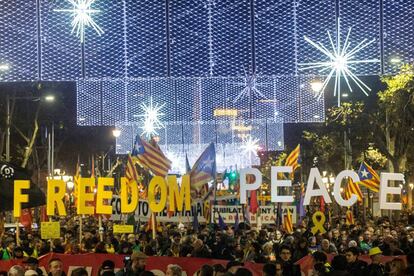Spanish Cabinet meets in Barcelona despite protests and road blocks
Thousands of supporters of Catalan independence have joined an evening march that began at 6pm

Thousands of supporters of Catalan independence have joined a march that began at 6pm in downtown Barcelona.
The demonstration follows a daylong series of protests that resulted in at least 13 arrests as pro-independence activists blocked major roads and clashed with police in Barcelona, where Spanish Prime Minister Pedro Sánchez was holding a special Cabinet meeting.

The protests were led by the self-styled Committees to Defend the Republic (CDR), a group that has staged similar action in the past. There were traffic disruptions on 20 roads, including the A2 highway and the AP-7 toll road, where demonstrators laid down car tires and held signs with messages like “Let’s implement the republic” and “Let’s take down the 1978 regime,” alluding to the Spanish Constitution of 1978 that signaled the transition to democracy following four decades of rule by dictator Francisco Franco.
Riot officers from the Catalan police force, the Mossos d’Esquadra, faced CDR activists who built a barricade and hurled objects in the Drassanes area of Barcelona. One individual was held for carrying material that could have been used to make an explosive device. Two more people were arrested in L’Ampolla, in Tarragona province.
Next stops, Alicante and Mérida
The central government is determined to hold more Cabinet meetings outside Madrid, with the goal of “getting close to citizens and showing affection for the regions that we serve,” said Deputy PM Isabel Celáa. The next gathering outside the capital will take place in Alicante sometime in the first three months of 2019. There is another one planned in Mérida, in the western region of Extremadura.
The protests were triggered by Sánchez’s decision to hold his Friday Cabinet meeting in Barcelona rather than Madrid as part of an ongoing drive to take these gatherings to various parts of Spain. The date also coincided with the first anniversary of a snap election held in the region that gave separatists a slim majority. That election took place shortly after Madrid’s decision to temporarily suspend Catalan self-rule in the wake of an unauthorized referendum and unilateral declaration of independence in October 2017.
Thousands of national, regional and municipal police officers had been mobilized in anticipation of potential unrest. Police in Barcelona were also tasked with securing the area around the building where the Cabinet met, the Llotja de Mar, which activists attempted to surround. The meeting proceeded without incident between 10am and 1pm despite the protests outside.
A pro-independence organization called Òmnium Cultural staged an “alternative Cabinet meeting” just a few meters down from the Llotja building to protest the ministerial gathering. “Not since the days of Franco had a Cabinet met in Barcelona to show us its authority. You are irresponsible and all you seek is provocation,” said the organization’s vice-president, Marcel Mauri.
Positive meeting
Meanwhile, the Socialist Party (PSOE) government in Madrid is making “a very positive assessment” of the private meeting between PM Pedro Sánchez and Catalan premier Quim Torra, who met on Thursday in Barcelona. In a joint press release, both leaders said they were committed to finding a “political proposal that is widely supported by the Catalan people.”
On Friday, the Cabinet greenlighted several symbolic measures for Catalonia, such as changing the name of Barcelona airport to Josep Tarradellas Barcelona-El Prat, to honor a former Catalan head of government who lived in exile during Franco’s rule.
The Spanish minister for Territorial Policy, Meritxell Batet, addressed renewed criticism from the Popular Party (PP) and center-right Ciudadanos, who accuse the government of making concessions to Catalan separatists because Sánchez depends on separatist parties for support in Congress, where he leads a minority government.
Batet said that no concessions have been made, and that the PSOE’s proposed solution to resolve the Catalan crisis involves reinforcing the region’s existing powers of self-rule.
English version by Susana Urra.
Tu suscripción se está usando en otro dispositivo
¿Quieres añadir otro usuario a tu suscripción?
Si continúas leyendo en este dispositivo, no se podrá leer en el otro.
FlechaTu suscripción se está usando en otro dispositivo y solo puedes acceder a EL PAÍS desde un dispositivo a la vez.
Si quieres compartir tu cuenta, cambia tu suscripción a la modalidad Premium, así podrás añadir otro usuario. Cada uno accederá con su propia cuenta de email, lo que os permitirá personalizar vuestra experiencia en EL PAÍS.
¿Tienes una suscripción de empresa? Accede aquí para contratar más cuentas.
En el caso de no saber quién está usando tu cuenta, te recomendamos cambiar tu contraseña aquí.
Si decides continuar compartiendo tu cuenta, este mensaje se mostrará en tu dispositivo y en el de la otra persona que está usando tu cuenta de forma indefinida, afectando a tu experiencia de lectura. Puedes consultar aquí los términos y condiciones de la suscripción digital.








































